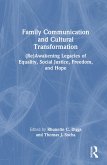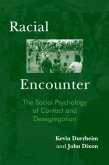Innovative Stigma and Discrimination Reduction Programs Across the World
Herausgeber: Nordstrom, Alicia H; Goodfriend, Wind
Innovative Stigma and Discrimination Reduction Programs Across the World
Herausgeber: Nordstrom, Alicia H; Goodfriend, Wind
- Gebundenes Buch
- Merkliste
- Auf die Merkliste
- Bewerten Bewerten
- Teilen
- Produkt teilen
- Produkterinnerung
- Produkterinnerung
Offering practical stigma and discrimination reduction programs in a range of domains including mental health, disability, ethnicity, and sexuality, this book is the answer to "What can we do?" to improve interpersonal relationships by reducing societal stigma towards social groups that are prime targets of prejudice.
Andere Kunden interessierten sich auch für
![The Psychology of Politically Unstable Societies The Psychology of Politically Unstable Societies]() The Psychology of Politically Unstable Societies182,99 €
The Psychology of Politically Unstable Societies182,99 €![Family Communication and Cultural Transformation Family Communication and Cultural Transformation]() Family Communication and Cultural Transformation170,99 €
Family Communication and Cultural Transformation170,99 €![Race, Gender and the Activism of Black Feminist Theory Race, Gender and the Activism of Black Feminist Theory]() Suryia NayakRace, Gender and the Activism of Black Feminist Theory182,99 €
Suryia NayakRace, Gender and the Activism of Black Feminist Theory182,99 €![An Introduction to Pablo González Casanova An Introduction to Pablo González Casanova]() Jaime Torres GuillénAn Introduction to Pablo González Casanova171,99 €
Jaime Torres GuillénAn Introduction to Pablo González Casanova171,99 €![Racial Encounter Racial Encounter]() Kevin DurrheimRacial Encounter182,99 €
Kevin DurrheimRacial Encounter182,99 €![Prison Masculinities Prison Masculinities]() Prison Masculinities182,99 €
Prison Masculinities182,99 €![Psychology for Social Workers Psychology for Social Workers]() Lena RobinsonPsychology for Social Workers213,99 €
Lena RobinsonPsychology for Social Workers213,99 €-
-
-
Offering practical stigma and discrimination reduction programs in a range of domains including mental health, disability, ethnicity, and sexuality, this book is the answer to "What can we do?" to improve interpersonal relationships by reducing societal stigma towards social groups that are prime targets of prejudice.
Produktdetails
- Produktdetails
- Verlag: Taylor & Francis Ltd (Sales)
- Seitenzahl: 304
- Erscheinungstermin: 29. Oktober 2021
- Englisch
- Abmessung: 229mm x 152mm x 19mm
- Gewicht: 603g
- ISBN-13: 9780367487225
- ISBN-10: 0367487225
- Artikelnr.: 62226548
- Verlag: Taylor & Francis Ltd (Sales)
- Seitenzahl: 304
- Erscheinungstermin: 29. Oktober 2021
- Englisch
- Abmessung: 229mm x 152mm x 19mm
- Gewicht: 603g
- ISBN-13: 9780367487225
- ISBN-10: 0367487225
- Artikelnr.: 62226548
Dr. Alicia Nordstrom is a professor of Psychology at Misericordia University in Pennsylvania, USA. Her research interests include interventions to reduce stigma, stereotypes, and stress and to promote mental health in college students. Her research has appeared on NPR, TEDxLancaster, and the NYC Broadway Bound Theatre Festival. She is also an actor, director, writer, and producer of theater, sketch, improv, and film. Dr. Wind Goodfriend is a professor of Psychology at Buena Vista University in Iowa, USA. She has written or edited over 10 books in Social Psychology, including her textbook which won the 2019 Most Promising New Textbook of the Year award from the Textbook and Academic Authors Association. She is an award-winning author, teacher, and researcher.
Preface: An Introduction to Stigma Intervention (Wind Goodfriend)
1. A Social Cognition Model of Bias Reduction (Gordon B. Moskowitz and
Joseph A. Vitriol)
Part 1: Mental Health
2. Honest, Open, Proud (HOP): A Program to Combat the Stigma of Mental
Illness with Strategic Disclosure (Carla Kundert and Patrick W.
Corrigan)
3. Reducing Help-Seeking Stigma through Self-Affirmation (Daniel G.
Lannin, David L. Vogel and Patrick J. Heath)
4. The Acceptability and Effectiveness of Mental Illness Anti-Stigma
Programs at the High School and University Level (Ryan Golt,
Stephanie Zito, Bilun N. Böke and Nancy L. Heath)
Part 2: Ethnicity/Race
5. Twubakane: Contact-Based Programs to Strengthen Social Cohesion in
Post-Genocide Rwanda (Trisha Dehrone, Brooke Burrows, Linda R. Tropp,
Rezarta Bilali and Ginny Morrison)
Part 3: Sexuality/Gender
6. De-stigmatizing Survivors: Intervening by Changing the Composition of
Campus Alerts about Sexual Assault (Elizabeth R. Brown, Jennifer K.
Wesely and Curtis E. Phills)
7. Workshop Activity for Gender Equity Simulation (WAGES): An
Evidence-Based Experiential Learning Tool for Educating about Gender
Bias across Learning and Work Contexts (Jessica L. Cundiff, Leah R.
Warner, Kaitlin McCormick-Huhn and Stephanie A. Shields)
8. Effectiveness of a Multidimensional Web-Based Intervention Program to
Change Brazilian Health Practitioners' Attitudes Toward the Lesbian,
Gay, Bisexual, and Transgender Population (Angelo Brandelli Costa and
Henrique Caetano Nardi)
Part 4: Weight and Body Size
9. A Systematic Review and Meta-Analysis of Interventions that Reduce
Weight Stigma Towards Self or Others (Dr. Leah M. Kaufmann and
Catherine Bridgeman)
10. Achieving a Reduction in Weight Stigma by Providing a Holistic
Education Intervention Targeting Nutrition Knowledge and Bias (Thea
Werkhoven)
11. Reducing Weight Stigma in the Workplace (Mikki Hebl, Cassandra N.
Phetmisy, Ivy Watson and Felix Y. Wu)
Part 5: Ageism
12. Ageism-Reduction Programs (Sheri R. Levy, Ashley Lytle, Caitlin
Monahan, Jamie Macdonald and MaryBeth Apriceno)
Part 6: Poverty
13. The Stigma of Poverty and Race and Interventions to Mitigate Its
Effects in Brazil and Senegal (Jorge Jacob and Valerie
Purdie-Greenaway)
14. An Experiential Learning Simulation to Reduce Poverty-Based Stigma:
Changing the Hearts, Minds, and Actions of the Economically
Advantaged (Jonathan Mendel, Stephen C. Wright, Maitland W. Waddell,
Odilia Dys-Steenbergen, McKenzie Bahrami and Angela Chin)
Part 7: Teaching Diversity Appreciation
15. An Ally Skill-Building Workshop (Larry R. Martinez, Megan Snoeyink
and Kelly Hamilton)
16. The Voices Project: Using Activist Theater in the Classroom to Reduce
Racism and Stigma of Mental Health (Alicia Nordstrom)
1. A Social Cognition Model of Bias Reduction (Gordon B. Moskowitz and
Joseph A. Vitriol)
Part 1: Mental Health
2. Honest, Open, Proud (HOP): A Program to Combat the Stigma of Mental
Illness with Strategic Disclosure (Carla Kundert and Patrick W.
Corrigan)
3. Reducing Help-Seeking Stigma through Self-Affirmation (Daniel G.
Lannin, David L. Vogel and Patrick J. Heath)
4. The Acceptability and Effectiveness of Mental Illness Anti-Stigma
Programs at the High School and University Level (Ryan Golt,
Stephanie Zito, Bilun N. Böke and Nancy L. Heath)
Part 2: Ethnicity/Race
5. Twubakane: Contact-Based Programs to Strengthen Social Cohesion in
Post-Genocide Rwanda (Trisha Dehrone, Brooke Burrows, Linda R. Tropp,
Rezarta Bilali and Ginny Morrison)
Part 3: Sexuality/Gender
6. De-stigmatizing Survivors: Intervening by Changing the Composition of
Campus Alerts about Sexual Assault (Elizabeth R. Brown, Jennifer K.
Wesely and Curtis E. Phills)
7. Workshop Activity for Gender Equity Simulation (WAGES): An
Evidence-Based Experiential Learning Tool for Educating about Gender
Bias across Learning and Work Contexts (Jessica L. Cundiff, Leah R.
Warner, Kaitlin McCormick-Huhn and Stephanie A. Shields)
8. Effectiveness of a Multidimensional Web-Based Intervention Program to
Change Brazilian Health Practitioners' Attitudes Toward the Lesbian,
Gay, Bisexual, and Transgender Population (Angelo Brandelli Costa and
Henrique Caetano Nardi)
Part 4: Weight and Body Size
9. A Systematic Review and Meta-Analysis of Interventions that Reduce
Weight Stigma Towards Self or Others (Dr. Leah M. Kaufmann and
Catherine Bridgeman)
10. Achieving a Reduction in Weight Stigma by Providing a Holistic
Education Intervention Targeting Nutrition Knowledge and Bias (Thea
Werkhoven)
11. Reducing Weight Stigma in the Workplace (Mikki Hebl, Cassandra N.
Phetmisy, Ivy Watson and Felix Y. Wu)
Part 5: Ageism
12. Ageism-Reduction Programs (Sheri R. Levy, Ashley Lytle, Caitlin
Monahan, Jamie Macdonald and MaryBeth Apriceno)
Part 6: Poverty
13. The Stigma of Poverty and Race and Interventions to Mitigate Its
Effects in Brazil and Senegal (Jorge Jacob and Valerie
Purdie-Greenaway)
14. An Experiential Learning Simulation to Reduce Poverty-Based Stigma:
Changing the Hearts, Minds, and Actions of the Economically
Advantaged (Jonathan Mendel, Stephen C. Wright, Maitland W. Waddell,
Odilia Dys-Steenbergen, McKenzie Bahrami and Angela Chin)
Part 7: Teaching Diversity Appreciation
15. An Ally Skill-Building Workshop (Larry R. Martinez, Megan Snoeyink
and Kelly Hamilton)
16. The Voices Project: Using Activist Theater in the Classroom to Reduce
Racism and Stigma of Mental Health (Alicia Nordstrom)
Preface: An Introduction to Stigma Intervention (Wind Goodfriend)
1. A Social Cognition Model of Bias Reduction (Gordon B. Moskowitz and
Joseph A. Vitriol)
Part 1: Mental Health
2. Honest, Open, Proud (HOP): A Program to Combat the Stigma of Mental
Illness with Strategic Disclosure (Carla Kundert and Patrick W.
Corrigan)
3. Reducing Help-Seeking Stigma through Self-Affirmation (Daniel G.
Lannin, David L. Vogel and Patrick J. Heath)
4. The Acceptability and Effectiveness of Mental Illness Anti-Stigma
Programs at the High School and University Level (Ryan Golt,
Stephanie Zito, Bilun N. Böke and Nancy L. Heath)
Part 2: Ethnicity/Race
5. Twubakane: Contact-Based Programs to Strengthen Social Cohesion in
Post-Genocide Rwanda (Trisha Dehrone, Brooke Burrows, Linda R. Tropp,
Rezarta Bilali and Ginny Morrison)
Part 3: Sexuality/Gender
6. De-stigmatizing Survivors: Intervening by Changing the Composition of
Campus Alerts about Sexual Assault (Elizabeth R. Brown, Jennifer K.
Wesely and Curtis E. Phills)
7. Workshop Activity for Gender Equity Simulation (WAGES): An
Evidence-Based Experiential Learning Tool for Educating about Gender
Bias across Learning and Work Contexts (Jessica L. Cundiff, Leah R.
Warner, Kaitlin McCormick-Huhn and Stephanie A. Shields)
8. Effectiveness of a Multidimensional Web-Based Intervention Program to
Change Brazilian Health Practitioners' Attitudes Toward the Lesbian,
Gay, Bisexual, and Transgender Population (Angelo Brandelli Costa and
Henrique Caetano Nardi)
Part 4: Weight and Body Size
9. A Systematic Review and Meta-Analysis of Interventions that Reduce
Weight Stigma Towards Self or Others (Dr. Leah M. Kaufmann and
Catherine Bridgeman)
10. Achieving a Reduction in Weight Stigma by Providing a Holistic
Education Intervention Targeting Nutrition Knowledge and Bias (Thea
Werkhoven)
11. Reducing Weight Stigma in the Workplace (Mikki Hebl, Cassandra N.
Phetmisy, Ivy Watson and Felix Y. Wu)
Part 5: Ageism
12. Ageism-Reduction Programs (Sheri R. Levy, Ashley Lytle, Caitlin
Monahan, Jamie Macdonald and MaryBeth Apriceno)
Part 6: Poverty
13. The Stigma of Poverty and Race and Interventions to Mitigate Its
Effects in Brazil and Senegal (Jorge Jacob and Valerie
Purdie-Greenaway)
14. An Experiential Learning Simulation to Reduce Poverty-Based Stigma:
Changing the Hearts, Minds, and Actions of the Economically
Advantaged (Jonathan Mendel, Stephen C. Wright, Maitland W. Waddell,
Odilia Dys-Steenbergen, McKenzie Bahrami and Angela Chin)
Part 7: Teaching Diversity Appreciation
15. An Ally Skill-Building Workshop (Larry R. Martinez, Megan Snoeyink
and Kelly Hamilton)
16. The Voices Project: Using Activist Theater in the Classroom to Reduce
Racism and Stigma of Mental Health (Alicia Nordstrom)
1. A Social Cognition Model of Bias Reduction (Gordon B. Moskowitz and
Joseph A. Vitriol)
Part 1: Mental Health
2. Honest, Open, Proud (HOP): A Program to Combat the Stigma of Mental
Illness with Strategic Disclosure (Carla Kundert and Patrick W.
Corrigan)
3. Reducing Help-Seeking Stigma through Self-Affirmation (Daniel G.
Lannin, David L. Vogel and Patrick J. Heath)
4. The Acceptability and Effectiveness of Mental Illness Anti-Stigma
Programs at the High School and University Level (Ryan Golt,
Stephanie Zito, Bilun N. Böke and Nancy L. Heath)
Part 2: Ethnicity/Race
5. Twubakane: Contact-Based Programs to Strengthen Social Cohesion in
Post-Genocide Rwanda (Trisha Dehrone, Brooke Burrows, Linda R. Tropp,
Rezarta Bilali and Ginny Morrison)
Part 3: Sexuality/Gender
6. De-stigmatizing Survivors: Intervening by Changing the Composition of
Campus Alerts about Sexual Assault (Elizabeth R. Brown, Jennifer K.
Wesely and Curtis E. Phills)
7. Workshop Activity for Gender Equity Simulation (WAGES): An
Evidence-Based Experiential Learning Tool for Educating about Gender
Bias across Learning and Work Contexts (Jessica L. Cundiff, Leah R.
Warner, Kaitlin McCormick-Huhn and Stephanie A. Shields)
8. Effectiveness of a Multidimensional Web-Based Intervention Program to
Change Brazilian Health Practitioners' Attitudes Toward the Lesbian,
Gay, Bisexual, and Transgender Population (Angelo Brandelli Costa and
Henrique Caetano Nardi)
Part 4: Weight and Body Size
9. A Systematic Review and Meta-Analysis of Interventions that Reduce
Weight Stigma Towards Self or Others (Dr. Leah M. Kaufmann and
Catherine Bridgeman)
10. Achieving a Reduction in Weight Stigma by Providing a Holistic
Education Intervention Targeting Nutrition Knowledge and Bias (Thea
Werkhoven)
11. Reducing Weight Stigma in the Workplace (Mikki Hebl, Cassandra N.
Phetmisy, Ivy Watson and Felix Y. Wu)
Part 5: Ageism
12. Ageism-Reduction Programs (Sheri R. Levy, Ashley Lytle, Caitlin
Monahan, Jamie Macdonald and MaryBeth Apriceno)
Part 6: Poverty
13. The Stigma of Poverty and Race and Interventions to Mitigate Its
Effects in Brazil and Senegal (Jorge Jacob and Valerie
Purdie-Greenaway)
14. An Experiential Learning Simulation to Reduce Poverty-Based Stigma:
Changing the Hearts, Minds, and Actions of the Economically
Advantaged (Jonathan Mendel, Stephen C. Wright, Maitland W. Waddell,
Odilia Dys-Steenbergen, McKenzie Bahrami and Angela Chin)
Part 7: Teaching Diversity Appreciation
15. An Ally Skill-Building Workshop (Larry R. Martinez, Megan Snoeyink
and Kelly Hamilton)
16. The Voices Project: Using Activist Theater in the Classroom to Reduce
Racism and Stigma of Mental Health (Alicia Nordstrom)








